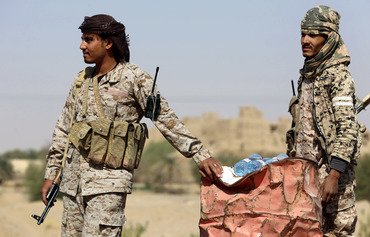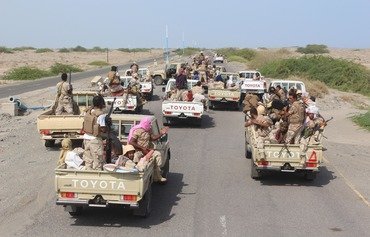Recent al-Qaeda attacks targeting security checkpoints in Yemen's Abyan province have had a negative impact on development efforts, stability and reconstruction activity, Yemeni officials said.
Such attacks hinder development efforts and affect the financing and implementation of public services projects in the education, health, water and electricity sectors, they said.
Al-Qaeda elements recently carried out a series of attacks on security checkpoints in the southern province of Abyan, including an August 28th machine-gun attack on a checkpoint in Ahwar district's al-Mahasma area.
Five members of the UAE-backed Security Belt forces were killed and two others were wounded in the incident.
The following day, suspected al-Qaeda elements attacked al-Qarnain checkpoint in Lawdar district's al-Ain, firing a barrage of bullets and sparking clashes between the two sides.
Lawdar district security chief Col. Mohammed Homsan al-Awdali survived an assassination attempt on August 20th, when suspected al-Qaeda gunmen opened fire on his motorcade as it passed through the Shohat intersection.
Attacks impede progress
"The sporadic terrorist attacks carried out by al-Qaeda directly impact the projects in progress in the targeted areas, affecting both the financier, the implementer and even the workers," said Ahwar district director Yaslam Bouset.
"The suspension of the projects, coupled with repeated terrorist incidents, forces the financier to withdraw funding and stop the project," he told Al-Mashareq.
The Ahwar-Al-Mahfad road project and the Ahwar vocational institute building are among the projects that have stalled, he said, along with dams and other infrastructure projects that have been suspended since 2011.
In 2011, al-Qaeda overran and seized control of a number of Abyan districts, including Lawdar and Ahwar.
Targeting security personnel will jeopardize stability "and thus threaten the efforts to achieve progress by the local and central authorities", said al-Mahfad district director Ahmed al-Rabie of the renewed al-Qaeda attacks.
"School and educational facility rehabilitation projects, for example, are temporarily suspended whenever a terrorist attack occurs," he told Al-Mashareq.
This delays the school enrollment process and impacts students' education.
Each time this happens, the cost of implementing a project increases, and the period needed to complete it is lengthened, he said, which delays the intended benefit to the community.
Development tied to stability
Terror attacks have many negative effects on the revival and advancement of Yemen's communities, economist Abdul Jalil Hassan told Al-Mashareq.
"Terrorist attacks in a certain region give a negative impression to the government and external donors funding these projects that these areas may be incubators for terrorist groups," he said.
This "leads to the suspension of projects under implementation, withdrawal and diversion of funds to other regions or countries", he added.
Hassan said the occurrence of terror attacks in a certain area increases the financial risk to the contractor, implementer and workers, and consequently increases costs and causes delays in implementation.
This adversely affects the community that would otherwise stand to benefit from these projects, he said.
"Development is tied to long-term stability and flow of investment and funding, and to the country’s citizens standing with these efforts that seek reconstruction, not sabotage, as al-Qaeda and other armed groups do," he said.
Abyan governor Maj. Gen. Abu Bakr Hussein Salem announced the allocation of 100 million Yemeni riyals ($400,000) for the rehabilitation of educational facilities in Lawdar during his visit to the district on August 28th.
Lawdar district is facing security challenges, Salem said, noting that it is imperative that residents, regardless of their political or ideological affiliation, cast aside their divisions, stand together and work towards unity.
All must work towards achieving successes in the arenas of security, education, water and health, he said.
Lawdar district lost many of its sons in the 2011 and 2015 battles against al-Qaeda, he said, noting that public infrastructure and the homes of many residents were destroyed at that time.

![Yemenis sell petrol on the street after government forces re-entered the Abyan provincial capital of Zinjibar on August 16th, 2016, to recapture the city from al-Qaeda. [Saleh al-Obeidi/AFP]](/cnmi_am/images/2018/09/10/14358-Yemen-Abyan-vendors-600_384.jpg)






